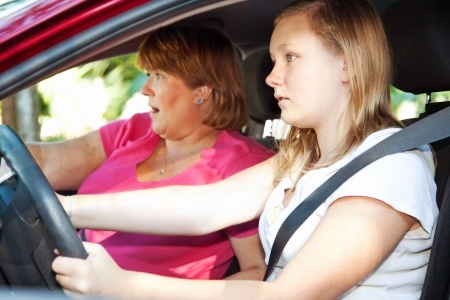October Sees the Most Auto Accident Claims from Teen Drivers
 Sept. 30 will mark three years since the state of Massachusetts strengthened its laws for teen drivers.
Sept. 30 will mark three years since the state of Massachusetts strengthened its laws for teen drivers.
Under the Safe Driving law, which took effect in 2010, teen drivers age 16 ½ to 18 are banned from all cell phone use and there is no texting while driving for operators of any age. The Junior Operator Law, which was passed in 2007, bans teen drivers from carrying passengers under the age of 18, except siblings. They also cannot drive between the hours of 12:30 a.m. and 5:00 a.m., unless accompanied by a parent.
Massachusetts is not alone; most states now have Graduated Licensing Laws restricting teen drivers in some way. In 47 states, novice drivers have passenger restrictions and 48 states limit nighttime driving. Teens are banned from all cell phone use in 37 states.
There is good reason for the laws: For each mile of roadway, teens age 15- to 20-years-old are three times more likely to die in a car accident than other drivers, according to the National Highway Traffic Safety Administration.
Now is a good time to observe how well your teen driver is obeying the laws. Every year, the AAA Foundation for Traffic Safety reports June, July and August see the largest number of teen driving deaths. But one nationwide company, State Farm Insurance, reports October is another dangerous time. It sees the most claims from 16- and 17-year-old drivers in this month, up 15 percent from other times.
Teen drivers get into auto accidents because they lack experience, are sensitive to distractions and do not always follow the rules. A few tips for helping your Massachusetts teen driver:
Say No to Teens Using Their Cell Phones. Many teens are texting while driving, despite the laws. In a 2011 study of 8,500 U.S. high school students age 16 and older, 45 percent admitted to texting or e-mailing while driving in just the past 30 days. The study was conducted by the Centers for Disease Control and Prevention and was published in the June issue of Pediatrics Journal. These teens were more likely not to wear their seat belt.
Encourage your teen to turn their cell phone off or put it in the backseat while driving. Taking a peek at text messages, e-mails or their Facebook page is not allowed. That includes while sitting at traffic lights and intersections where they need to look out for other traffic, as well as pedestrians and cyclists.
Limit Teen Passengers in the Car. Drivers under 18 in Massachusetts are not allowed to carry passengers under the age 21, except siblings. Be vigilant on this point with your teen. Among 16- and 17-year-old drivers, there is a 44 percent higher chance they will be killed in a crash with even one passenger under 21 years old, according to the AAA Foundation for Traffic Safety. The number multiplies with each additional passenger under 21, but decreased over 60 percent for each passenger age 35 or older.
Test Drive School Zones. Let your teen observe from the passenger seat as you drop them off to school and pick them up. You will encounter traffic, bicyclists and children walking, which will be new and potentially stressful for them as a driver (even if they traveled this area during their Driver’s Education practice hours). Point out how you adjust to the activity and decrease your speed.
If you do not drive to school, take this ride outside school hours and then let them drive. The goal is to make them aware of the challenges and make them comfortable in case they have to drive at some point.
Cyclists and Pedestrians. Remind your teen of what they learned in Driver’s Education class. Make sure they stop well behind the crosswalk at intersections and always let pedestrians pass. Remind them that cyclists can travel the full width of the road. Remind them to make sure cyclists are not approaching when they open any doors in the car.
Other Driving Safety Tips. These are the foundation of all driving safety tips, but always worth a reminder for safety’s sake: Talk to your child about always wearing a seat belt, following the speed limits and never using drugs or alcohol while operating.
The most important things are to talk to your children about driving and to set a good example yourself when they are in the car with you. Visit this web page for additional suggestions.
Related:
Teen Driver Safety Week
Study: Teens who text and drive take even more risks, USA Today
About Breakstone, White & Gluck
The Boston car accident lawyers at Breakstone, White & Gluck have over 100 years combined experience handling auto accident claims throughout Massachusetts, from Boston and Cambridge to Framingham and Worcester and other cities. If you have been injured, learn your rights. For a free legal consultation, contact us at 800-379-1244 or 617-723-7676 or use our contact form.

